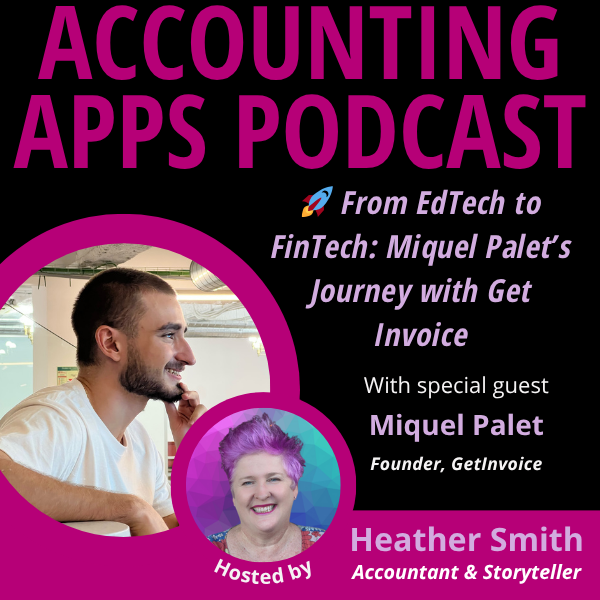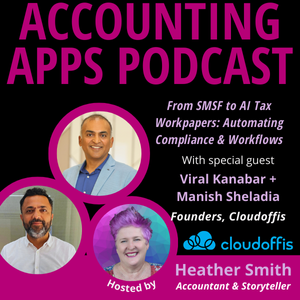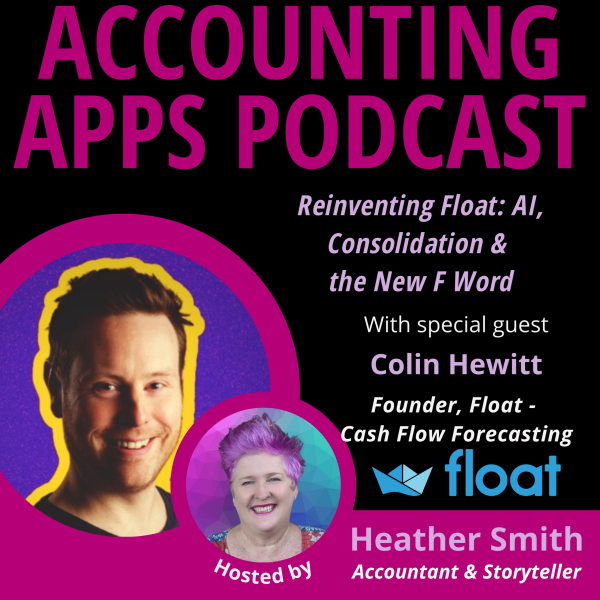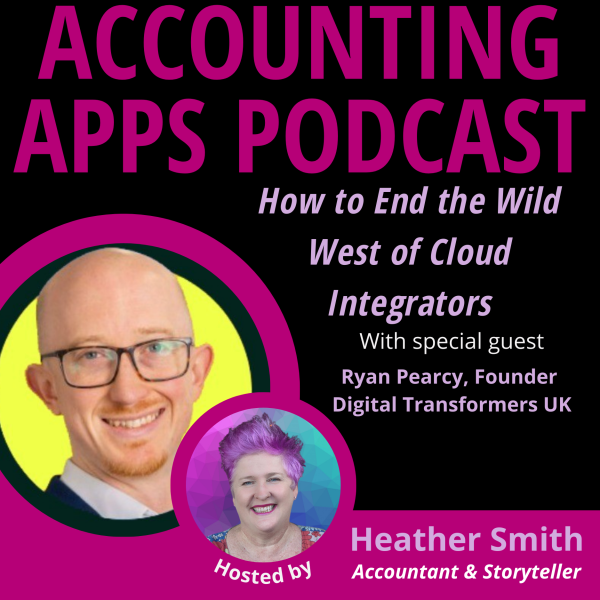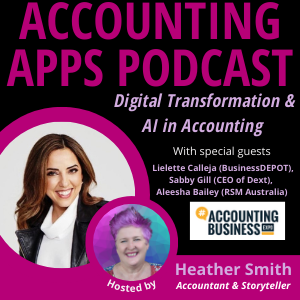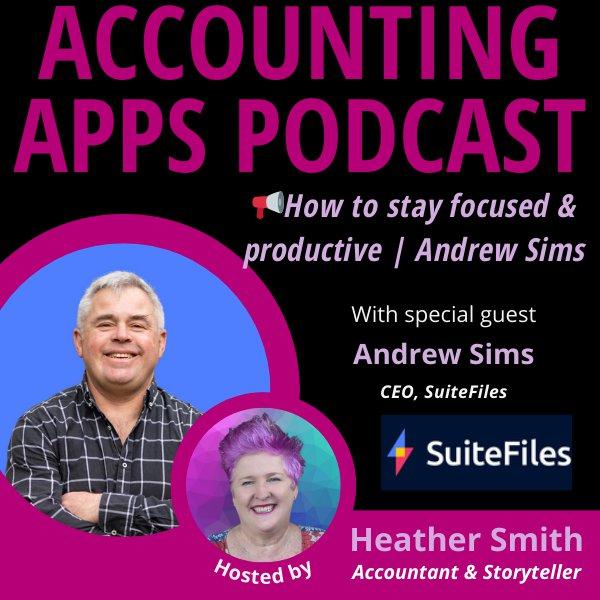Highlights of my conversation with Nick Hazel
- Benefits of focusing on a niche customer base
- Unexpectedly becoming a business coach in the café industry
- Xero plus other cloud solutions used in a growing bookkeeping practice
- The ultimate cloud solutions for cafes
- What an add-on solution needs to do to get in front of bookkeeper Nick Hazel
Subscribe to Episode #18 of Cloud Stories on iTunes:
https://itunes.apple.com/au/podcast/cloud-stories-heather-smith/id908333807
Heather: Hi, it’s Heather Smith here. Thank you so much for joining me today. Today I’m interviewing a bookkeeper by the name of Nick Hazel. He runs a business called Café Bookkeepers but before I get to that interview, I just wanted to tell you about two things. I’ve recently started up two groups on social media, one on Facebook and one on LinkedIn, and they’re both called The Xero Mastermind Group. They’re a support group for those wanting to step up their Xero journey. It’s an opportunity to discuss, explore, share insights on Xero and the Xero ecosystem from my time at the Auckland Xerocon.
One of the statistics they were throwing around was only 40% of Xero partners were using an add-on solution. I really want to champion the add-on solution and see if we can sort of increase it so we have a full business platform working within our businesses, and encourage the adoption of Xero add-on solutions within the community, which in turn improves productivity and profitability for both us as advisers and for the small businesses that we consult to. In invite you to join me. Just search for Xero Mastermind Group on both Facebook and on LinkedIn.
I spent the morning today with a client and it was kind of like a big facilitated session, and the client’s vision was: anything we can automate, we want automated, which is sensational. They outlined their business model and we go through and we identify all the add-ons that we can plug into Xero to give them the full automation that the business needed, and in effect remove any costs around data entry, errors, and have seamless integrations working.
They ended up … I can’t go into too much depth about what they ended up with but it was Shopify sitting as the ecommerce on their website, LinkedIn to their inventory, LinkedIn to Xero. For staff scheduling, they were using Deputy, and Receipt Bank was plugged in there as well for all bill scanning. It was really exciting. I think they’re going to even look at a few more … they’re going to look at a reporting add-on solution to get the high level dashboard reporting information there but those clients are really going to be ahead.
That business is going to be so far ahead of other businesses in its category because of the access to up-to-date seamless information, that they’re going to be able to use the manage their business, make decisions and drive their business forward. It was really very exciting.
But back to today’s interview. Thank you again for joining me today. I spoke with Nick Hazel. I’ve been trying to organise an interview with him for a few weeks now. He runs a very interesting business and I think, especially for those of you who are bookkeepers, you will find this a really interesting interview. I had such wonderful feedback about the interview I did very early on with Gayle Buchanan, another bookkeeper.
Nick Hazel is a young professional with two bookkeeping businesses, Café Bookkeepers and Monocle Bookkeeping. Both businesses utilise the latest in cloud software to provide cost effective, efficient service to the clients. Café Bookkeepers is a bookkeeping solution for the hospitality industry. They work in cafés, restaurants, bars, in Sydney, Melbourne and Australia wide. I started by asking Nick:
What is your typical coffee order and what is your favourite coffee bean?
Nick: That’s a good question. It does change. I am probably most likely to order a Piccolo Latte which I’m often asked about by non-coffee drinkers. What it is, is the same amount of coffee as a regular latte, there’s just less milk.
Heather: So it’s kind of like a reduced calorie coffee?
Nick: That’s it, reduced calorie and probably …
Heather: Intenser.
Nick: Intense caffeine hit but it’s a pleasant drink as well, so stronger than a latte but definitely worth trying if you’ve never had one.
Heather: Well, hopefully some people will try that. Do you have a favourite coffee bean?
Nick: No, it changes. There’s another coffee that I like to drink at the moment. It’s called filter coffee. I guess it’s more along the lines of a tea. There are a lot of great roasters at the moment doing a lot of filter coffee. They change their beans weekly, so you’re always getting different tastes from around the world.
Heather: When you say filter coffee, you’re not talking about the old American filter coffee that kind of drips through like sort of a paper towel into a round glass coffee thing? Is that what you’re talking about?
Nick: Yes, it’s actually not too far from that.
Heather: We’ve gone full circle then.
Nick: It’s true. There’ll probably be barista out there that will tell me there’s far more to it, which I’m sure there is, but if you’re just kind of watching a barista make a filter coffee, that’s all there is. It’s a filter, pour in some hot water, but it’s probably … the quality of the bean and the product is probably a lot better than what you’re used to if you’ve had a regular American filter coffee before.
Heather: Yes, they are an experience unto themselves. I was in Paris last year and we had this sort of broken English conversation with a barista in this little café. Everyone was smoking and it was like 7am in the morning and he served us an Espresso … he was drinking an Espresso so we said, “We want to have what you’re drinking.” So he served us an Espresso and it was really strong. It’s just in a teeny tiny little thimble cup and we said to him, “Okay, that was pretty quick. How many of those do you have a day?” He said, “27.”
Nick: Oh my goodness. Was he speaking to you hanging off the roof when he said that?
Heather: Well, we never saw him sleep our entire time in Paris. We had to walk by this café all the time and he was always standing there, so maybe he did never sleep. I guess just the different levels of coffee that people take. I’ll definitely try that Piccolo Latte the next time I go out for coffee.
Nick: Good, let me know what you think.
Heather: I will do.
So Nick, why did you start Café Bookkeepers?
Nick: Look, the reason I started with cafés is purely coincidence. A good friend of mine opened a café and wasn’t sure what to do with his bookkeeping, so I helped him out and from there just started to grow with other cafés that I’d frequent, I’d get to talking to them and they’d say, “Look, we don’t really have a good solution we’re happy with for our bookkeeping, can you help us out?” One grew to five, grew to 10 and about four years on we look after about 60 in the hospitality space.
Heather: Wow, that is amazing. Has that grown from word of mouth?
Nick: Yes, all word of mouth. A lot of coffee has been drunk by myself just going into cafés in my area and just starting a conversation. That’s been one of the real advantages of just focusing on cafés, is straight away you know who your client is. It’s not as though I need to spend a lot of money on advertising or mail outs, I can just simply walk into a potential client’s office I guess.
Heather: That’s a really good point.
My question, and that kind of leads into it, why did you decide to focus on the café industry? So accidentally you fell into it and one of the benefits has been that you actually know who your client is, are there any other reasons why you’ve decided to continue with that and focus on the café industry?
Nick: Yes, I accidentally fell into it but I also found that it’s an industry that I’m passionate about. I really enjoy the company of hospitality business owners. I guess overall it was accidental that I fell into it but I get a real kick out of working with the hospitality crowd.
Do you think one day you might open your own café or partner up and open a café?
Nick: I think it’s inevitable. I think it’s hard to hone your skills in the industry and see all the numbers and figures and ins and outs that we do and not think, “Hey, I could probably have a crack at this.” That said, I don’t know how I’ll go working long hours on my feet. I think if I was to do it, it’ll be more of a background role.
Heather: Yes.
Nick: I’m pretty useless at making coffee as well.
Heather: I actually know an accountant who’s focused on the café industry and she runs a café but she never steps inside it. She has cameras on every area that cash could handle and she monitors it from her desk. The café is actually like in Western Australia or somewhere like that and she just monitors it from her desk what’s happening in the café – distant management of it. I don’t know if you get the same sort of passion from doing it that way.
Nick: Yes, I guess it depends on your personality but it’s definitely possible.
What do you find is unique about the café industry?
Nick: I think what’s unique is the … I think overall there’s a real … how do I put it? There is a misconception about the industry. The biggest thing that I’ve found is that people looking outside into the industry look at cafés and think, “Okay, whoever owns this must be earning a lot of money.” Generally if I just ask somebody that’s not in the accounting space, “What do you think that this hospitality business turns over? What do you think the owner makes?” They usually estimate double consistently to what the owner actually takes home.
In general, I think it makes it very hard because it’s a competitive industry. You might have 10 cafés within a kilometre radius of each other. If one of them changes their pricing, it affects all the others. The margins just become finer and finer.
Heather: Okay, that’s really interesting.
What have you found to be the benefits of focusing on a niche? I know that you’ve explained a few of them. Have you found there have been any other benefits of focusing on a niche area or a vertical industry?
Nick: Yes, it’s effective for both my business and the clients as well. In terms of my business, it’s great because once you’ve looked after a few in the hospitality space, you generally know what’s going to occur when you take on a new client. It makes it very easy to plan. It’s very easy to train our staff. It’s very easy to give cost estimates. It just makes everything very streamline.
On the same note, it’s great for our clients because we’ve got data from 60 businesses that are essentially in the same field, so we can see how everybody is performing. If somebody is probably running at say a higher wage cost than most of the industry, we can let them know and look at ways to bring down their expenses.
So as well as getting them to a compliance level, you are gaining a lot of insight into the industry and sort of operating as a business coach to some extent, would that be correct?
Nick: Yes, definitely. I guess that’s something I wasn’t expecting when I began working in the industry. I think, as well, not just for hospitality but I think for bookkeeping and accounting in general, things are really going to be shaken up because there was a time where just reconciling the accounts and providing basic reports I thought, “Wow, I’m really adding value to my clients.” Now I look at it and go, “That’s just scratching the surface.” There’s so much more value that we can now add to our clients because we’ve gone niche and we’ve got so many businesses within the same space.
Heather: Excellent.
Within your own business, what cloud based solutions are you using?
Nick: The cloud based solutions we’re using are Xero. We use Xero Accounting Software for all of our clients.
Do you insist they take on Xero?
Nick: Yes, we won’t work with any clients that aren’t on Xero, just because it means that we can’t give them the cost effective solution. The only time we use other accounting software at the moment is if we’re converting those clients to Xero.
The other add-ons we use, and it changes from client to client, but generally everybody is using Receipt Bank which is …
So within your own physical business, not with your clients, what are you using? Within your own business, you’re using Xero? Are you using anything else within your own business?
Nick: Sorry, yes we are. We also use a really good … it’s like a project management tool called Asana. It’s similar programme to WorkflowMax. I just find, for us, it’s easier to use and it’s really effective. For me, I’ve got two bookkeeping businesses. We’re both using Asana and it just means you can get a really good overview of what is necessary to be done for your clients, what your staff are doing. If you’re following a task, you get flagged and updates to say, “Hey, this is where it’s up to.” It just makes the visibility of the business much, much easier.
Heather: Does it have any integration with Xero?
Nick: Asana doesn’t integrate with Xero, no, but it integrates with other software that we use. We use, for instance, Zendesk and we use a time tracking software called Everhour, and these all integrate together.
Heather: Excellent.
Then following on from that questions, what you initially … perhaps I worded my question incorrectly was what cloud based solutions are you recommending and are your clients using?
Nick: Xero for all our clients, Receipt Bank which is a solution for the client to take photos of their bills and invoices and receipts.
Do you find most of the clients are happy to take up Receipt Bank?
Nick: Yes, initially with some clients that are used to dropping things off or having things picked up, they do need a reminder but once they’ve seen how easy it is … I think the real benefit that they see is when they’re in their Xero file, if they want to look at a particular invoice, they’ve got access there straight away. Once they see that, “Hey, I can look at my profit and loss and drill down and actually see a copy of the physical invoice,” they’re sold.
Heather: Awesome.
Nick: The other tool we’re using which we’ve only implemented in the last few months is called CrunchBoards. Have you seen CrunchBoards?
Heather: Yes.
Nick: It’s a great reporting tool. It just means instead of pushing reports from Xero to Excel to punch in ratios and formulas, you can do a lot of that automatically through CrunchBoards. Once the board is set up, kind of like the live bank feed to Xero, your figures and PNLs and balance sheets are pushed to CrunchBoards. I liken it to a live Excel spreadsheet.
Heather: Excellent. Thank you for sharing that. I think I was aware that you were using CrunchBoards.
Nick, what does a typical day look like for you?
Nick: It’s a good question. Being a small business owner, no two days ever seem to be the same but most of my days now would be big picture works. I’m lucky enough that we’re at the stage where the day-to-day is looked after and I’m just trying to find better solutions for our clients and trying to really add value. It’s an interesting place. I get excited by it each day because … we’ve got happy clients, don’t get me wrong, but I look at what we’re doing and go, “Wow, there’s so much more we could be doing.”
It’s just trying to find ways to really add high levels of value without turning around to a client and saying, “Look, we’re going to have to up your retainer by X amount of dollars.” There’s a lot of R&D at the moment.
Heather: Excellent.
How does an add-on solution from the Xero marketplace get in front of Nick Hazel?
Nick: To be honest, I probably would get in front of them first. I’m always looking for the latest and greatest. I’m gen-Y, so maybe that’s got something to do with it. Sometimes just by chance, like I was looking for a great reporting solution and we’d tried a few things, and then I ran into Amy from CrunchBoards at a Xero event. I said I’d never heard of CrunchBoards. I said, “What do you do?” it turned out it was exactly what we were after. So that was by chance that time.
Heather: Yes, that’s sensational. Was that the Sydney Xerocon?
Nick: Yes, Sydney Xerocon. It would have been last year.
When you’re walking around a Xerocon conference, what attracts you to go and speak with someone who has got a demonstration stand there? Is it that you’ve got a need and that you go to them or do you sort of wander by all of them?
Nick: I wander by all of them. I think every time that I’m at one of those events, there’s probably two or three things on my list of things that I’m researching and that I’d like to find solutions for. But every now and then, it’s great, you come across add-ons that you think, “Wow, I didn’t even think of that. What a great idea. How can I implement this for our business?”
Heather: Yes, like you don’t even know you needed it. That’s sensational.
Nick: There’s always a part of me that’s very jealous. You think, “Wow, how come I didn’t come up with that idea.” That’s when you know you’ve come across a great add-on.
Heather: That’s very good. We’ve already suggested are you going to open a coffee store, do you think maybe you’ll go into solution or add-on design?
Nick: I won’t rule it out. I think it’s one of those things, if it’s something you get excited about each day then why not? There are a few things that are in the pipeline for Café Bookkeepers that I’m not quite sure how I’m going to get from A to B to C but I know that, for instance, if we’ve got 60 businesses and they’re all ordering paper cups, maybe there’s a way that Café Bookkeepers can, I guess, look at purchasing those in bulk for our clients and therefore saving them money or getting better deals with suppliers.
There are a few things like that in the pipeline that, as I said, scratching the surface with just, “Hey, here’s your profit and loss report.” But looking at ways where we can, I guess, improve the margins of the industry as a whole.
Heather: Yes, there are always these innovative solutions because I know that you have the shopper dockets and I know every so often you get these branded coffee cups come out. It seems like a lot of like the Di Bella … in Brisbane we have the Di Bellas and the Merlos and the Has Beans and they push out their own coffee cup to be used with their coffee but I guess you could try and get Xero to sponsor a whole month of coffee cups for all of your clients, how about that?
Nick: That’s it. I tell you what, that’s not a bad idea Heather.
Heather: Let’s do that. We’ll ring them up afterwards. I have one more question for you.
As a bookkeeper, have you found any benefit in joining the bookkeeping business groups and associations?
Nick: Yes and no. I always get mixed feelings from different associations. There are some, for instance, we’ve got … the area I’m in in Sydney is Newtown and there’s a local precinct of businesses that get together and that is a fantastic meeting every month. Whereas I’ve joined some other groups before and have found that maybe I don’t get as much out of it. I think if the group, whether it be bookkeeping or otherwise, is there to really improve things and push the industry or the area forward, it’s great. But if it’s a whole lot of people in a room just trying to improve things for themselves, I find I get less out of those events.
Heather: Yes, it’s interesting because some events attract people and you feel very claustrophobic almost in the events. I go to an event and it’s old people, they’ll probably be upset that I’ve said that, and I just like it because they’ve just all got a story to tell and no one is trying to push a sale on your and it’s just an opportunity to kind of talk about the general area but then you go to some other really high powered, everyone is crazy, crazy, crazy, going for it.
What does the next three years have in store for Nick Hazel?
Nick: Hopefully, as I’ve said a few times, I feel like there’s a lot of value to be added to the industry that I love which is the hospitality industry. It’s just a matter of working out, “Hey, what are the best ways, most efficient ways, and the ways we can really improve the industry?” That might not even be in the bookkeeping or accounting space. It’s just always looking for ways to improve things and who know where that will lead.
Heather: While you were saying that, I just thought of another question.
Do you use the add-on or do you encourage your clients to use the add-on, Beat the Q, the little iPhone app?
Nick: I wouldn’t say I actively encourage but I guess majority of our cafés already use it. It’s a great little piece of software.
Heather: And it kind of improves cash flow doesn’t it because they get paid in advance of the coffee don’t they? Is that how it works?
Nick: Yes, exactly. It’s like … there’s a similar bar tab app.
Heather: Are there? Oh my goodness.
Nick: That can be dangerous.
Heather: It sounds very dangerous. If I didn’t explain that for people listening in, Beat The Q is a little iPhone app. I have it on my phone and I kind of call up the area and it’ll tell me what cafés I can order from and then I can place my order, do the payment and then arrive there and the coffee supposedly should be ready. Because I haven’t actually used it since I installed it on my phone, they just sent me out a 25% of everything for the whole of this week, so I must go and try and order it tomorrow.
Nick: That sounds like a good discount on a lot of Piccolo Lattes.
Heather: Yes, it does. I’ll go and see if that’s on the list. In this cloud based world, bringing things in like that can, I don’t know, I guess improve cash flow in certain areas.
I was also wondering do you use or do your clients use Deputy for scheduling?
Nick: Yes, a lot of our clients use Deputy. It’s amazing. Everyone loves Deputy who uses it. I particularly like … I was talking to the Gelato Messina team and Deputy now can tell you what the weather is going to be like. They can look on their app and go, “Okay, Friday is going to be outrageously warm, we better add 20% more staff to the shops.” I think that for me, again, is one of those add-ons or features you see and you think, “Wow, that’s innovative. That’s impressive.”
Heather: Yes, it is. I guess rain affects people, weather affects people. That is impressive. I wonder if it does project how many staff you need or it’s just you have to go in and fill the staff out yourself. Thank you Nick so much for being on the show. Really appreciate it and I’m sure the listeners got so much information from you today of all the different products you use and how you’re growing your business. Good luck with everything at Café Bookkeepers.
Nick: Pleasure, thanks for your time Heather.
Heather: Cheers.
Mentions
- Xero – https://www.xero.com/
- Café Bookkeepers – http://www.cafebookkeepers.com.au/
- Monocle Bookkeeping – http://www.monoclebookkeeping.com.au/
- Deputy – http://www.deputy.com/
- Receipt Bank – http://www.receipt-bank.com/
- Asana – https://asana.com/
- WorkflowMax – http://www.workflowmax.com/
- Zendesk – https://www.zendesk.com/
- Everhour – https://everhour.com/
- CrunchBoards – http://crunchboards.com/
- Beat the Q – https://www.beattheq.com/

